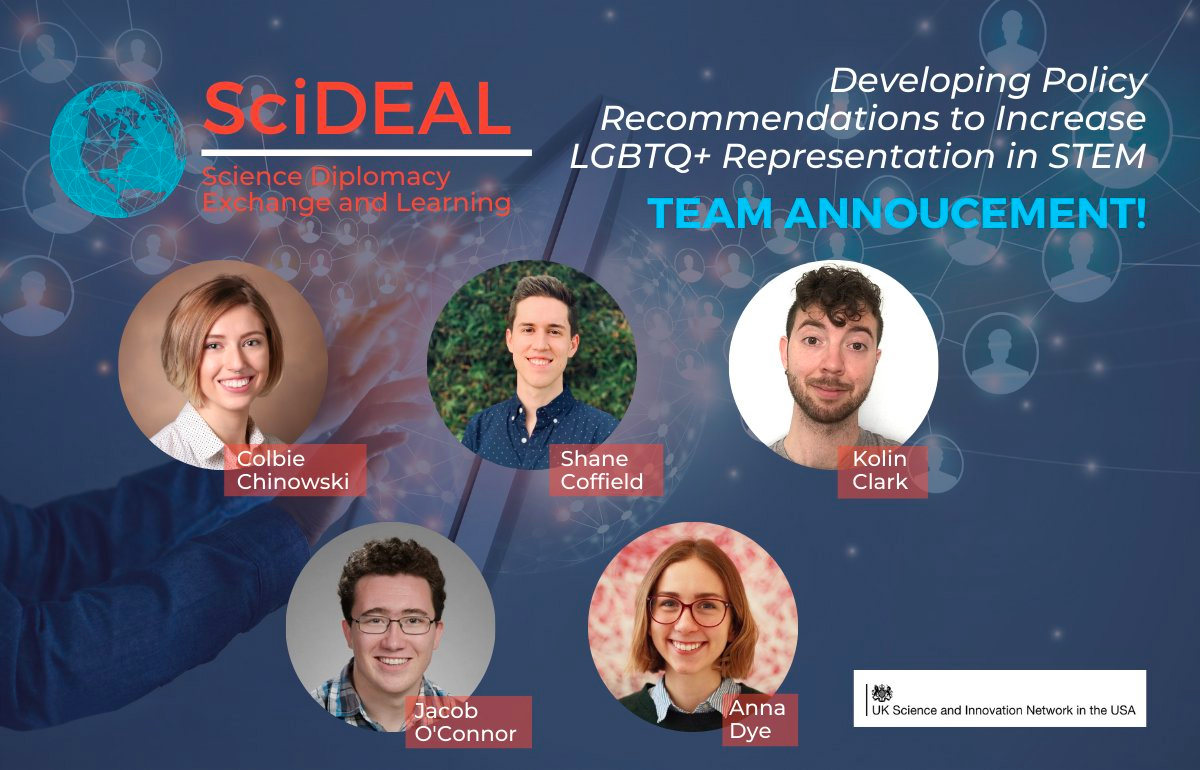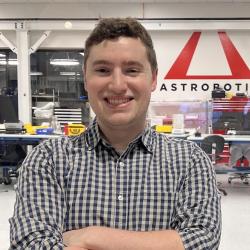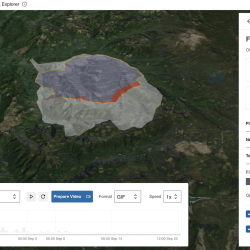‘We Need Data’: UMD Postdoc Calls for Improved Tracking of LGBTQ+ Representation in STEM
Shane Coffield, a researcher with the Earth System Science Interdisciplinary Center, advocates for an evidence-based approach to inclusion.
Shane Coffield is passionate about improving LGBTQ+ representation in scientific fields, but there’s a challenge: Workplaces and schools seldom collect data on the sexual orientation or gender identity of their staff or students, making it difficult to track whether progress is being made.

“We can’t change what we can't measure,” said Coffield, a postdoctoral associate with the University of Maryland’s Earth System Science Interdisciplinary Center. “We need data—not just for its own sake, but to drive positive change.”
Research shows that LGBTQ+ individuals experience discrimination and consider leaving STEM fields at higher rates than their non-LGBTQ+ peers. As one of five fellows selected by the U.S. National Science Policy Network (NSPN)—an association of early-career scientists across the U.S. who are interested in policy—Coffield has been working to change that.
Through his work with NSPN, Coffield has drawn international attention to the issue of LGBTQ+ representation by penning reports and blog posts, brainstorming solutions at conferences in the United States and United Kingdom, and navigating the nuances of collecting sensitive information in a responsible way.
When the NSPN fellows first started working together in 2021, their goal was to identify policies that could improve LGBTQ+ representation in STEM. However, that changed after they discovered just how little information on sexual orientation and gender identity—also known as SOGI data—is collected by scientific institutions. Though some qualitative studies explored the experiences of LGBTQ+ individuals in STEM, few examined the state of LGBTQ+ representation in STEM jobs and educational programs on a larger scale.
“The issue we sought to tackle was: How can universities or institutions improve retention—or reduce attrition—of these populations in STEM? What are some evidence-based policy interventions that we can recommend?” Coffield said. “Very quickly into the project, we realized it’s a hard question to answer because there's so little data on the subject of LGBTQ+ representation, let alone the effectiveness of policies to improve it.”
Their efforts culminated in two reports following a three-day diplomatic summit in the United Kingdom that brought together researchers and representatives from universities, government agencies, nonprofits and funding agencies. For Coffield, the meeting was a “powerful” experience.
“Most of the people in the room identified as LGBTQ, and you could tell it was a personal topic that everyone was passionate about,” he said. “There was a lot of positive energy, and people really cared about creating change in STEM.”
While attending another conference hosted by LGBTQ+ advocacy organization oSTEM—Out in Science, Technology, Engineering, and Mathematics—Coffield heard emotional statements from LGBTQ+ individuals who feared that revealing their sexual orientation or gender identity might jeopardize their safety or job security.
“We heard feedback from a few people, including a trans person who said, ‘I’m not disclosing that information to my state,’” Coffield said. “Safety concerns are very real, especially depending on where you’re located. The best recommendation that we can provide is that the whole process needs to be built on trust between the institutions and the individuals they’re asking information from.”
With those statements in mind, the NSPN fellows called for large-scale SOGI data but underscored the importance of establishing mutual trust. The fellows recommended that institutions be transparent about why they are collecting SOGI data and how they plan to use that information, while also taking extra care to make the process anonymous and keep the data secure. They also recommended that LGBTQ+ individuals be involved in the entire process, from writing the survey questions to collecting or analyzing the data.
“Most importantly, we emphasized that data collection must be used to support policies that improve STEM for LGBTQ+ people—for example, when it comes to issues related to STEM culture, harassment, healthcare, travel, facilities and more,” Coffield said.
While many scientific institutions still do not collect SOGI data, that is starting to change. Last year, the White House mandated the creation of SOGI data action plans across agencies, with recommendations outlined by the U.S. Office of Science and Technology Policy and the National Science and Technology Council—a move Coffield sees as a step in the right direction.
“It’s been a really good sign of progress coming out of the executive branch,” Coffield said. “Momentum is building.”
Universities have also begun to collect SOGI data within the constraints of state and federal guidelines. UMD representatives recently met on campus with members of the American Association for the Advancement of Science (AAAS) to discuss SOGI data collection and its relevance to the retention of LGBTQ+ students and employees.
In fall 2023, UMD enabled students to self-identify as “X” (non-binary) in the student information system. However, because the state of Maryland uses a gender binary—male or female—in some of its data collections, UMD has had to follow suit when submitting certain forms to the state. In the meantime, UMD representatives have been working to identify solutions to bridge those gaps.
When the university’s new Workday Human Capital Management and Finance system goes live in November 2024, personal identity information options for faculty, staff and students will be expanded to include gender details, pronouns and racial subcategories.
Coffield said he will continue advocating for SOGI data collection at UMD for prospective and current students and employees, as well as at NASA, where he conducts his research. While the NSPN fellows no longer meet as a group, they continue to work individually to share and implement their findings. What started as a short-term project has evolved into a larger mission to make STEM workplaces and classrooms more inclusive.
“We learned much more than we set out to—especially how to map out and bring together stakeholders around an understudied topic, host difficult conversations, develop international consensus and navigate the more political aspects of working with governments to bring about positive change for LGBTQ+ people,” Coffield said. “Now the real work begins, as we try to share, advocate for and implement our recommendations at our own institutions and beyond.”







